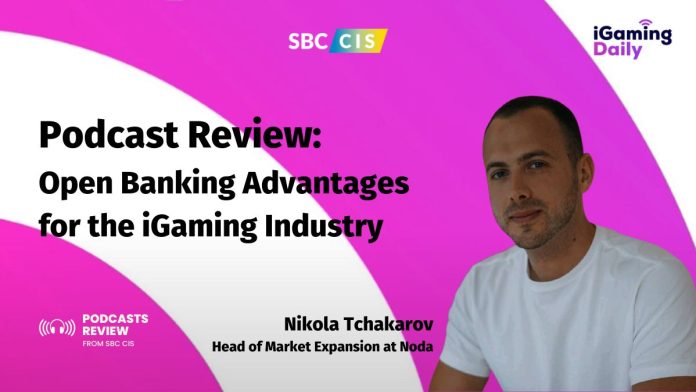At the recent CasinoBeats Summit in Malta, Nikola Tchakarov, Head of Market Expansion at Noda, participated in a keynote session, exploring significant changes in Open Banking and iGaming, while providing real-life examples, industry insights, and strategies to navigate this dynamic landscape. Thus, one of the latest episodes of the iGaming Daily podcast rode a wave of innovations and discovered the latest payment trends in iGaming.
“Imagine a world where you have complete control over your financial data and can securely share it with any institution or service provider you want,” Tchakarov started to explain the concept of Open Banking, a revolutionary idea transforming the financial industry.
Focusing on the iGaming industry, which experienced exponential growth over the past few years, Tchakarov mentioned that gaming platforms started embracing cryptocurrencies as a means of payment, offering faster transactions, enhanced security, and increase anonymity for their players, providing an alternative to traditional banking services. With all these developments, Open Banking is placed in a significant role from a FinTech perspective.
“By allowing customers to share their financial data securely with third-party providers, open banking aims to foster innovation, increase competition, and better customer experiences in the financial industry.
“As open banking continues to gain traction globally, we will likely see more and more iGaming operators adopting the technology to offer their customers a more seamless and secure payment experience.”
Open Banking represents a significant advancement in the financial sector, fundamentally reshaping the operations and customer interactions of financial institutions. By granting access to financial data, Open Banking facilitates the development of new products and services, offering customers enhanced convenience, cost-effectiveness, and personalized experiences.
Additionally, Open Banking fosters innovation and competition within the financial industry, potentially leading to more favorable terms and pricing for consumers. It also paves the way for new players, such as FinTech startups, to challenge traditional banks and financial establishments.
However, Tchakarov added that it is crucial to address privacy, security, and protection concerns arising from the increased accessibility of financial data. Therefore, open banking encompasses more than just payments; it encompasses a broader spectrum of transformations in the financial landscape.
“So open banking is not only about payments. It’s actually much more about that. Open Banking can enable aggregating financial data from multiple sources. And I believe that’s the main value it has to offer.
“Its APIs enable secure and seamless transactions for iGaming platforms, eliminating the need for payments for traditional payment methods. Additionally, Open Banking’s KYC capabilities enhance user verification, strengthening anti-money laundering and prevention and fraud prevention measures.”
One of the main issues Open Banking has been facing in the past couple of years since its adoption is that not all banks are still offering separate instants. The Noda team basically allows its clients to set limits and volumes to be pre-approved upon deposit that was in their account.
“There is little to no risk. As with our Open Banking technology, we can actually see whether the account has the necessary funds to complete the transaction. And to date, there has been not a single case where the account was actually not funded. We’re also closing the payment cycle with payouts. That’s something also very cool for the iGaming industry.”
He added that another remarkable advantage of Open Banking technology is the elimination of chargebacks. Unlike traditional payment methods, Open Banking makes it technically impossible to initiate a chargeback. Instead, if a customer wishes to request a refund, they can follow the standard refund processes established by the operators and platform providers.
Don’t forget to subscribe to our Telegram-channel!











